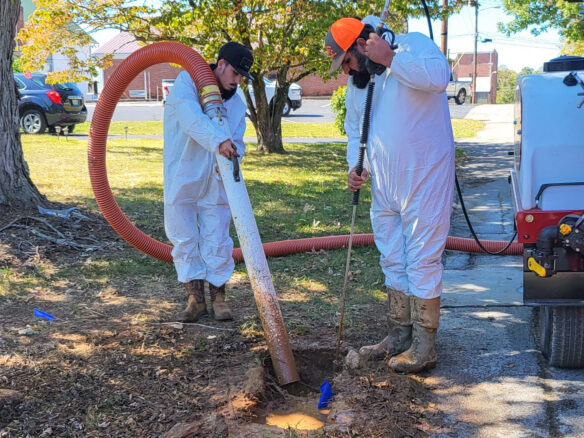
Jacob Rock and his mentor at the Green River Valley Water District, Charles Gordon, run a hydro excavator as part of Rock’s apprenticeship.
Photo courtesy Heather Stevenson, Kentucky Rural Water Association
A group of high school students is getting intensive training as future utility operators by the Kentucky Rural Water Association (KRWA).
The KRWA partakes in the Tech Ready Apprentices for Careers in Kentucky (TRACK) program, a collaborative effort by the Kentucky Department of Education’s (KDE’s) Office of Career and Technical Education and the Kentucky Office of Employer and Apprenticeship Services to provide secondary students with registered apprenticeship programs into career pathways. The Office of Employer and Apprenticeship Services exists within the Education and Labor Cabinet.
Director Scot Treece of the La Grange Utility Commission said the program fills an important need of getting young people involved in the water utility industry and preparing them for professional success.
“There’s a shortage of operators and finding people to fill these positions is very difficult,” Treece said. “You can get a young person involved and excited about something. It’s just a win-win for both of us.”
KDE’s Office of Career and Technical Education (OCTE) is the only organization in the Commonwealth recognized as an apprenticeship ambassador by the U.S. Department of Labor, focusing on providing quality work-based learning experiences for students across Kentucky. The apprenticeship ambassador initiative brings together industry, labor, education, equity and workforce leaders to prepare individuals for workforce entry.
KRWA Workforce Development Coordinator Heather Stevenson said the organization’s involvement with TRACK benefits rural communities.
“I tell people water is life. Our communities can’t exist without the services that the utilities provide them,” she said. “[The] apprenticeship in itself is a grow-your-own approach. They are able to grow their own certified operators.”
However, for utilities to develop their own operators requires extensive effort.
“Apprentices have to complete 4,000 hours of on-the-job training, as well as 288 hours of related technical instruction,” she said. “If you have services, there has to be a responsible operator in charge.”
Dustin Turner, an incoming senior, is a TRACK program participant and an apprentice in the La Grange Utility Commission.
“I got here and started working in the water field and started realizing how people get their water and how water treatment is important for the people that drink it,” Turner said. “The great moments … [include] putting in your first meter, taking your first chlorine test or just finally getting the hang of things that you’ve never done or knew happened.”
Turner is learning from Josh Rahm, an employee of the utility commission and Turner’s mentor in the apprenticeship program.
“He’s taught me anything from putting a valve in, to testing chlorines, to going into the computers and marking where meters are; making sure that they are there, setting meters,” he said.
Rahm said he appreciates the opportunity to help Turner grow and learn.
“It’s been interesting to just be able to teach him,” he said. “It’s nice to see that somebody his age is looking to do this.”
Rahm wishes he had been able to participate in a similar program years ago.
“I wish I would have had this program when I was in school so that I could have more years in the industry,” Rahm said.
In addition to mentorship opportunities, the apprenticeship program with KRWA allows young people to learn to use advanced equipment on the job. Turner is “using technical tools like GIS and learning how to help create digital mapping,” Stevenson said.
Like Turner, Alex Ford and Jacob Rock, apprentices with the Green River Valley Water District (GRVWD) in southcentral Kentucky, were high school career and technical education (CTE) students before recently graduating with their diplomas.
The two earned welding certificates in their high school CTE program, and Ford said this prior experience helps in the work he does at the water utility.
“Some of the projects we did require teamwork,” he said of his time as a student in the CTE pathway. “You had to use your brain and think of certain ways to fix certain items.”
Turner was an agriculture student who said his prior CTE experience in a greenhouse taught him about the importance of having clean water, free of chemicals. He learned about agriculture in a greenhouse setting at his high school.
Andrew Tucker, GRVWD’s general manager and a mentor to Ford and Rock, said supporting the apprenticeship students benefits the utility as well as the students.
“You train someone who has never been employed in any type of workforce totally different than you would someone who has the basic knowledge of driving the different trucks and equipment and stuff like that,” he said. “When you start out with someone as clean a slate as this, you’re able to teach them in ways that you’re not having to recreate and retrain bad habits.”
He said the program also teaches the apprentices other important lessons.
“I think they’ve learned … how dependent people are on us, but it’s easily overlooked,” said Tucker. “People turn on the faucet, they expect (water) to be there. These guys here have learned that it’s a 24/7 job and that you’re having to be called anytime.”
Regan Satterwhite, KDE’s OCTE policy advisor, said that these work-based learning programs empower students with real-life occupational experiences.
“It helps to bridge the gap between classroom knowledge and practical skills,” she said. “By integrating structured, hands-on experiences into the curriculum for career pathways, it nurtures students’ ability to apply their learning in the workplace.”
To learn more about TRACK, visit the Kentucky Department of Education’s Tech Ready Apprentices for Careers in Kentucky webpage.




Leave A Comment